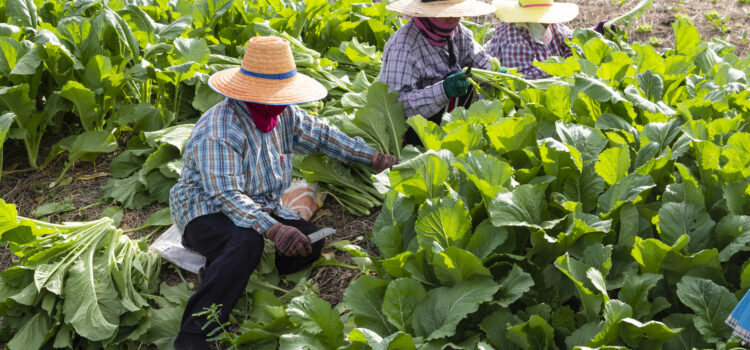
Farm workers across the country continue to go to work everyday during the COVID-19 pandemic because they are considered essential workers.
They risk their health while at work because often farm workers do not have access to personal protective equipment and can not always social distance.
Armando Elenes, who has worked for the United Farm Workers for nearly 20 years, has been working to help farm workers throughout the pandemic.
As the Secretary Treasurer for the UFW, Elenes oversees the memberships and organizing operations. He said the UFW represents more than 10,000 members across California, Washington, Oregon and Idaho.
There are nearly 450,000 farmworkers in the state of California, which makes up about half of the farmworkers in the country, according to Elenes.

We chatted with Elenes to discuss how the pandemic is affecting farm workers and to learn more about how the community can support these essential workers.
The interview has been edited for clarity and cut for length.
Q: How are farm workers being affected by the COVID-19 pandemic?
A: The most pressing issue right now is their health. They could be impacted by this virus and then on top of that is the financial hits. Some workers are losing work. Some workers are working longer than ever because agriculture sales are up by 8.5 percent overall. Some sectors are doing really well. It depends on what your sale model is. If your model is a vendor or the restaurant business, you are going to be impacted. If your sales focus on retail, you’re actually doing pretty well. They are trying to keep up with demand. The ones that are having a difficult time are the ones with the models that are predicated on the restaurant business.
Q: Have you heard of any positive cases among farm workers?
A: Yes, we have. Here in Kern County, there are quite a few cases. The problem is there is probably more going unreported. Historically farm workers don’t have access to health care, and a lot of them are afraid of what can happen to them in terms of imigration and public charge. They are so used to dealing with their own healthcare issues and working through it. If they are undocuemnted, they have no other income and no safety net. So, they either go to work or don’t get a paycheck. They feel they have no choice. There are workers who might have a kid with underlying conditions. One parent might decide to stay home to reduce the risk of one of them coming home with an infection and getting the children infected.
Q: Have working conditions improved or worsened with the pandemic?
A: Most of them are going to work and are kind of relieved they can go to work because they need the income, but at the same time, they are terrified of getting infected because they don’t have healthcare. It’s mixed feelings. Unfortunately, I think it’s really hard because they don’t really know if they are going to get sick. In some aspects they are used to it.
It’s tough when they don’t see their employers stepping up, and that’s happening here in Kern County. In the citrus industry, farm workers told us they haven’t been told anything about the Coronavirus. They are waiting to know if they are going to get PPE. I am hearing growers say farm workers need to bring their own face masks. That shouldn’t surprise me. They have to bring in their own pruning scissors. Growers already trained them on if they are going to work they need to bring their own tools. Farm workers have told us if they ask for tools, growers tell then don’t come to work. If they don’t ask for it, they have to pay for it.
There are some growers stepping up but not enough. Some unionization growers are not just doing the basics. They are going above and beyond. We have growers who say if you get sick, we are going to pay you and not lose any wages. We’ve had growers pay for employees health care so they don’t lose healthcare coverage if they are on layoff. We are proud of our union growers who have stepped up, changed their practices, and are enforcing social distancing to try to keep workers safe.
We have done polling on social media, and 77 percent of farmers’ practices are not changing. Farm workers in Kern are being sent home but not being offered sick pay. Nothing is changing.
Q: What kind of changes do you recommend growers implement to protect their workers?
A: We have been sending letters to growers with best practices, which should be easy for growers. The recommendations include providing extra washing stations so workers can wash their hands more and implementing social distancing. Those are not a heavy lift. We also recommend improving benefits like sick pay. Every time farm workers try to use sick pay, they are not allowed to use sick pay, or the growers say they don’t qualify or need doctor’s note or the growers tell the workers they don’t do that here. This would be a good way to stop the spread. If you don’t have any other income and don’t have access to sick pay, you aren’t going to stay home. If you are sick, you are probably going to hide the fact that you’re sick because you have no other choice.
Q: A bill is being proposed to lower wages for farmworkers. How do you expect this bill to affect the industry?
A: The growers have gotten $9.5 billion in direct assistance and another $14.16 billion in low-interest loans. The Trump administration and growers are now trying to reduce wages for farm workers. They should be getting paid sick leave and hazard pay, not a pay cut. Growers are not implementing best practices, which is shameful. They see the pandemic as an opportunity. Growers have always tried to reduce wages.
Q: Farm workers are essential during this pandemic. What can the community do to support them?
A: Go to our Facebook page and follow UFW. We are issuing weekly updates and actions. We are working to get face masks for farm workers. These workers are frontline workers in the fields. We are doing our best to lobby on their behalf, so whatever support the community can provide would be greatly appreciated